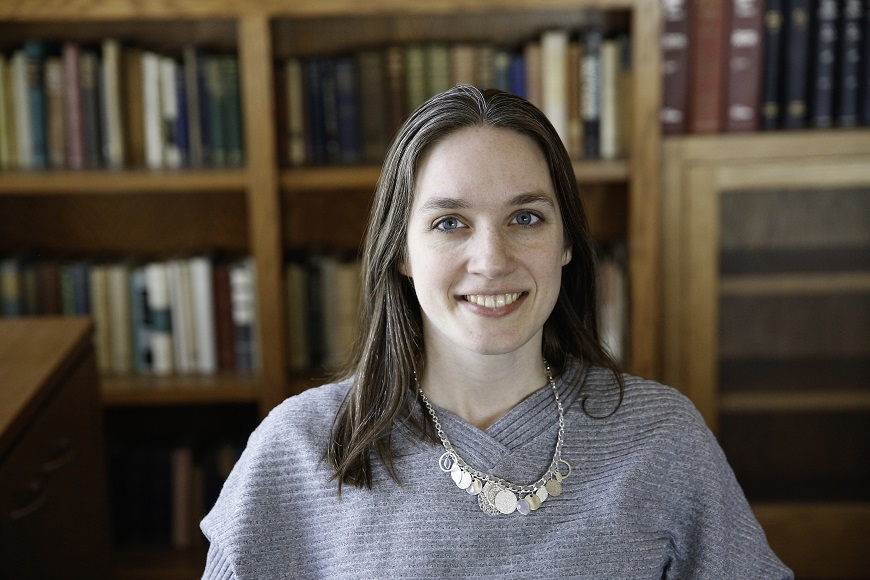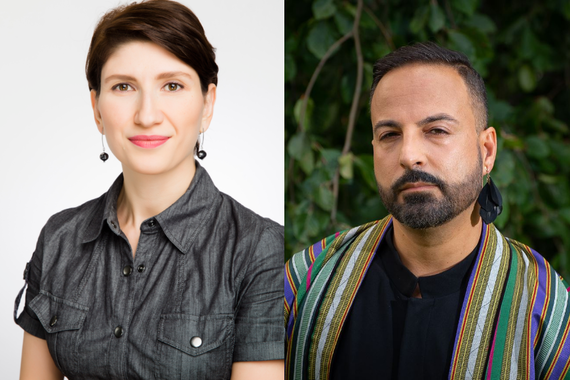Battling Misinformation When Health Is at Stake
As a researcher and mother, graduate student Kristin Lunz Trujillo’s research on misinformation around vaccines derives from personal experience while also completing a civic duty and making a splash in the research world. Her tenacity and dedication shine through with her most recent published research on MMR (measles, mumps, rubella) vaccines.
However, her devotion to educating the public on health policies and dismantling misinformation on basic health doesn’t stop there. She explains, “I'm interested in thinking about some of the major problems [surrounding misinformation and social ideologies] that are happening in the United States.”
Initial Inspiration
Lunz Trujillo, a first-generation student, completed her undergraduate work at Carleton College. Double-majoring in art history and studio art, she moved to Chile with her husband post graduation to begin teaching undergraduate classes. Her fascination with misinformation and political psychology began when teaching her students about art and media under European regimes.
“[I was interested in] misinformation and the media, from the political side of things, and thinking about people's psychology more,” Lunz Trujillo says. “That's why I entered into political science, and specifically political psychology.” Lunz Trujillo pursued the University of Minnesota for her PhD education because of the collaborative nature of the political science department.
Her newest published research revolves around the MMR vaccine, which is at the center of some major public health debates. As a mother of a child with autism, Lunz Trujillo was appalled by the incorrect and harmful misinformation being spread about vaccines causing autism and decided to take researching the topic into her own hands.
“I’d go online, and I'd see all this misinformation surrounding autism. And it was just outrageous,” Lunz Trujillo says. “I thought that even if the misinformation of vaccines causing autism were true, it's the idea that you'd rather risk someone's life than have [a child with] autism. Thinking that autism is the worst possible thing to have is so insulting.”
Because of her connection to the topic, Lunz Trujillo felt a deeper motivation to pursue this research. She believes her published work could help families understand why some people advocate these harmful ideas.
“Misinformation in health and medicine can be extremely dangerous because lives are at stake,” Lunz Trujillo emphasizes. “We can see a similar thing going on with COVID-19 and health misinformation now. If we endorse misinformation on who gets sick, how we get sick, and how we can prevent or avoid the disease, it can result in a devastating loss of life.” In The Conversation, an independent, nonprofit publisher of commentary and analysis, Lunz Trujillo and co-author Matthew Motta write, “We found that about one-fifth of Americans, and more than half of people who hold skeptical views toward vaccine safety, may be unwilling to pursue vaccination.”
Building Bridges
Finding an equilibrium between working and parenting sometimes proves difficult; however, her determination to be successful keeps her from slowing down. “It's been more difficult, but also, in many ways, more motivating, because I'm forced to be on top of my game,” she says, “and I'm forced to learn how to handle things efficiently.”
She also attributes the University's interdependent community in helping her find a balanced workflow. A little while after her son was diagnosed, Mathew Motta, a graduate student in her program, reached out to Lunz Trujillo because he was conducting similar research on MMR vaccines, and they co-authored a few projects.
“[The Department of Political Science] creates a community of scholars, and also a community of friends, which has really helped me flourish in terms of feeling encouraged to follow things that are really interesting to me,” she adds.
A Goal in Mind
Lunz Trujillo defines her research as studying political behavior and public opinion at a mass level, which covers other topics beyond research on vaccine misinformation endorsement. Inspired by her childhood in rural Minnesota and her time in Chile, her PhD dissertation applies these themes to how ideologies differ between urban and rural communities. This work primarily pertains to the United States, but she thinks these themes could also apply globally. She explains, “I consider myself a political psychologist, which just means that I use a lot of theories and ideas from social psychology to explain political attitudes and outcomes.”
One of her main goals is to be an academic and confront some of society's larger issues surrounding misinformation through her research. Lunz Trujillo says when it comes to health, misinformation can create life-or-death situations, which is why she’s determined to leave an impact. “If we want to correct some of this misinformation, we need to think about underlying motivations—underlying psychological dispositions that make people accept this in the first place.”
She emphasizes, “My research is significant because I hope I am contributing to our understanding of larger problems we face in society. These problems include misinformation and an increasingly hostile us-versus-them [dynamic], both of which are undermining our politics and making it difficult for the country to effectively tackle issues, to properly represent its citizens, or to create effective, good, and fair policies.”
This story was written by an undergraduate student in Backpack. Meet the team.


